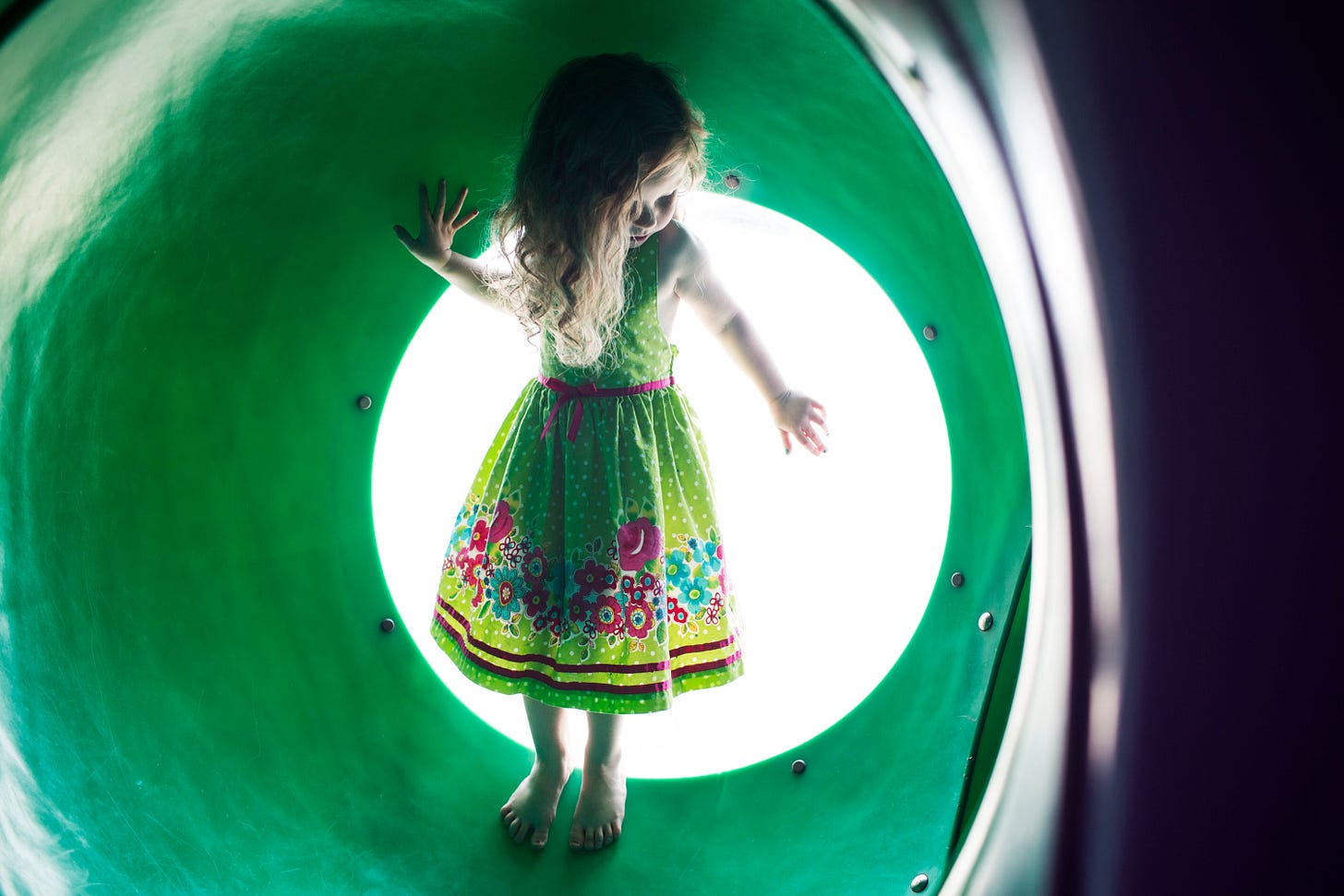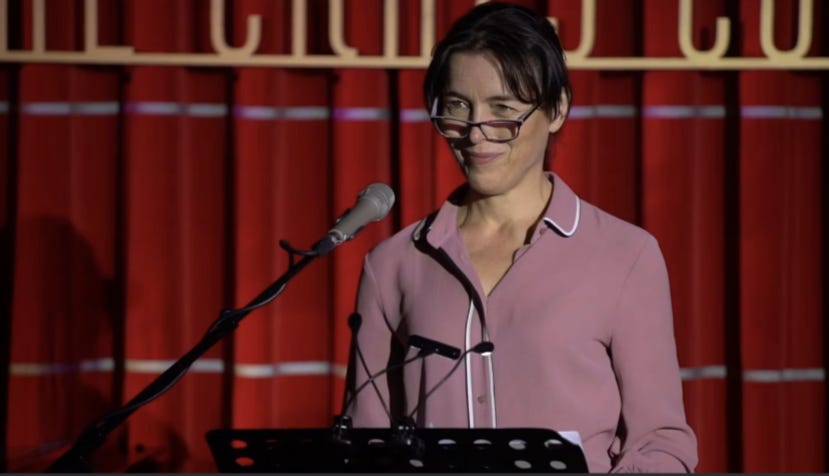On Regaining Our Innocence through Fiction
Perhaps
In 2016, I was asked to write a story of exactly 1,000 words, in response to a photograph.
I said yes.
I was sent four or five images, and chose this one —

It is by photographer and visual journalist Sara Naomi Lewkowicz.
I looked at it, loved it, and then I wrote a story — painlessly, as I remember.
I started with the girl’s voice, and what she might say.
She was bringing the reader in to her world.
I have often said to students that the first line of a story involves them taking the reader by the hand. Here, I decided to do just that, within the action.
It was important that the girl was speaking to a grown-up whilst herself being very young but very grown-up.
The story then moved away from her voice to the grown-up POV.
As I wrote, I was also thinking of short stories in which the main character has an interlude of rest, outside time. For example, Henry James’s ‘The Great Good Place’ (1900) and E.M.Forster’s ‘The Other Side of the Hedge’ (1911).
I was also thinking of Alice’s Adventures in Wonderland (1865) — which involves a very famous tea party, and an even more famous escape from normal life, down the rabbit hole.
Why have I been remembering this story recently? And thinking of sharing it here?
I think reading Claire Keegan’s Foster called it to mind.
In that short story/novella, the reader fears for the young girl who is narrating. She has been sent to live on a farm with an elderly couple, one summer, and we expect them to be cruel to her — we expect a Dickensian interlude, in which she is made to work or is neglected or worse. Nowadays, we expect adults in narratives mostly to be threatening to children. And we expect children to have their innocence destroyed.
Here, in my little story, I remember wanting a brief child-adult relationship that was entirely controlled by the younger party. In fact, the girl is in total command of her own little world. Once we — we suspect adults — enter the green space of the story, that’s where we are. For a while, we are safe there. Through this presence in a kindly space, as in Foster, we are given back some innocence. Our suspicions were, for once, proven wrong.
I think this is something fiction can do — make us feel the world still has possibilities for goodness.
Since it went up on the A Thousand Word Photos website, the story has been read aloud on a couple of occasions. It was written for the spoken voice, and usually gets a good response. The actress Olivia Williams has performed it for WordTheatreUK —which changed my sense of the story completely.
It has been called ‘I am an Eye’ and ‘Grab my Hand’ and first appeared as ‘At The Playground You Meet Someone Amazing’ — none of which seem quite right.
Anyway, here it is.
I hope you feel differently at the end than you did at the beginning —
Grab my hand, she said. That’s it. Now, she said, let me pull you up and in. And brilliant. And amazing, she said. Do you like my dress? but she didn’t wait for me to answer. I love my dress, she said. And now you’re inside the Big Eye – spelled E Y E – which is mine and is mainly green. You are welcome here, she said. She was very young but she spoke very precisely, if not exactly correctly. Right, she said, would you like a cup of tea? I’m sure you would because everybody likes to have a cup of tea at tea-time. I hadn’t known it was tea-time, and yet now I felt sure it was. And there you are, she said, after doing some pretend pouring. Carefully she put a pretend cup and saucer into my hand. I was still standing up, or rather bending down. I imagined the cup as being very delicate china and having a picture of a pink rose on the side. It was doll’s house crockery – the cup only big enough for two half-sips. The saucer as big as a 2p piece. I was about to lift the cup from the saucer and pretend to take a sip when she said, Oh dear, give it back to me. And so I gave her back the cup. What is it? I asked. I forgot to ask you if you wanted any sugar, she said. Well,… I said. Wait, she said. It’s not polite to interrupt. I crouched down lower and waited. There were no chairs, not even plastic ones, only the green floor. Would you like some sugar in your tea? she asked. Yes, please, I said, because I didn’t want to have gone through all that pretending for nothing. Two, please, I said. And with her small fingers she picked two tiny pretend sugarcubes from a pretend bowl and dropped them into the cup. There you are, she said, and handed the cup and saucer back to me. Sit down, she said, before I had a chance to take half a sip. I handed her back the cup and saucer, sat down on the green floor, and then took the cup and saucer back again. Thank you, I said. Finally, I thought. The girl didn’t sit down, and she didn’t serve herself. Aren’t you having any tea? I asked. She said, No, I’m here to be the perfect hostess. Have I asked if you liked my dress? And now I want to tell you a story. She started to speak, but I found I wasn’t able to listen. You see, to join in with her little game, I had taken a half-sip of the pretend tea – and it was completely delicious. It had depth as well as sweetness. The flavour wasn’t tired out from being too familiar. Not like all those thousands of mugs of tea I’ve knocked back without tasting them. This tea tasted like the tea that grown-ups let you have just a little of, when you’re too young to have it really. It was a first-time taste, and that made me realise I must be tasting it for the first time. Because what the tea tasted of most strongly was a future I hadn’t had yet. I was no longer my grown-up self. Instead, I was my pretend grown-up self from years and years ago. A self much smaller and less experienced. As the girl told her story, I looked around the Big Eye. Everything here was simple, and if something went wrong it could easily be fixed. If the perfect hostess forgot to offer you sugar, she could remember and then offer it to you a moment later. Nothing here was lost and gone forever, oh my darlin’ Clementine. My second half-sip of the tea made me realise I was somehow in the past. My own past. My own childhood. It was hard to believe, because I couldn’t ever remember being friends with a girl like her, or having tea in a green place like this. I wished I’d been able to follow the girl’s story, because she was frowning now and I could tell she’d come to a serious bit where the characters were in danger. But I could sense myself becoming restless. I wanted to get on with getting into the future, whether it was my familiar future or not. And I suddenly and vividly remembered this particular kind of impatience from childhood. From my own childhood. Whatever was going on, however exciting, I wanted it to be over. Because I knew it wasn’t really the thing. The thing was still to come. The thing was always ahead of me. And then, said the girl, seeming to become louder. Become audible. And then. But she faded out again. Yes, when I was young for the first time everything was and then and then and then. But now I was young a second time – even if only for a short while – and I was inside the Big Eye, which was mainly green. I had come to rest on a comfortable floor. And I realised there was absolutely no hurry. I said to myself, I’m not impatient. I can take my time or I can let my time take me. For now, at least, work is over. Home is where it always was. Whatever has been lost is safe in that lostness. It’s no longer dangerous. Those I love are busy with their lives, which are often difficult, but they’re getting along. They’re getting along and I’m here in the Big Eye. This is a moment of moments for me. This is a half-sip of what might always have been. And the girl said, And that’s the end of the story. What do you think? I had to say, I didn’t hear a word. Could you tell me it again? And the girl wasn’t annoyed, not for an instant. She was the perfect hostess. Of course, she said.



Lovely.
Brilliant story. Thank you for sharing.